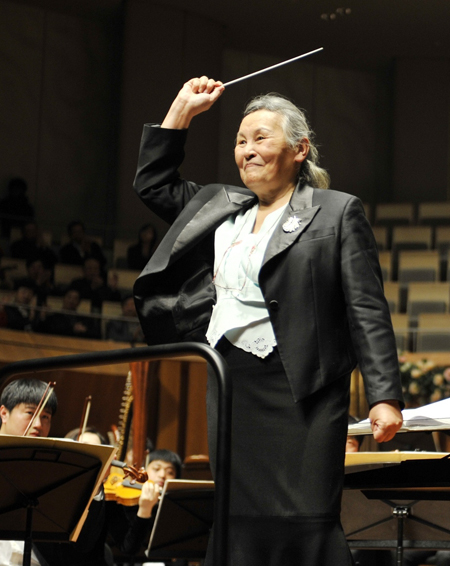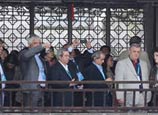
 |
| (Xinhua/Wang Fang) |
Now, money flows in when she announces a project. During her planning for a tour to Taiwan, an entrepreneur called her up and asked: "Do I have the honor to be the exclusive sponsor for your tour?"
Later, she visited that sponsor's manufacturing facility. "I was brought up to believe that private businesses were evil and now I have been able to open my eyes, just as I was opening their eyes and ears to the beauty of classical music," she says.
"I do not know these people and do not go binge drinking with them. Somehow they trust me. They must be telling themselves that the quaint old lady is doing something good for their city. For a symphony orchestra, you'll have to show them what you're good for, and not take things for granted. Having an orchestra is not an elitist or self-indulgent affair. You'll have to do something for the public, or you'll perish and nobody will miss you," she says.
During a recent tour to Russia, the orchestra played Echoes of Tulou, a Chinese symphony about Hakka people's traditional domicile. "What's the point of playing only Western music to a Western audience? To show you're capable of doing something they can recognize?"
The local hosting party strongly resisted the inclusion of a Chinese piece nobody in Russia had heard of, but Zheng persisted. The thunderous applause after the performance proved her right. "You have to push something of your own. If you're good, they'll accept it. That is your responsibility to the place that provides financing and nurtures you," she says.
"But it is not easy to find a quality work that is original and Chinese," she adds. She told her peers at the annual Chinese symphony orchestras summit, held in Xiamen this year, that one should not play Chinese music simply for the sake of Chinese music. It has to be good music in the first place.
Echoes of Tulou premiered in 2000. It was composed by Liu Yuan and commissioned by the Xiamen Philharmonic, which has performed it all over the world. Its musical language includes many local elements. Zheng, a Hakka herself, is not afraid to flaunt this unique flavor. In Berlin, a local chorus was hired to join in the vocal part - in Hakka dialect nonetheless.
To bring symphonic music to the masses, Zheng is willing to veer away from performance conventions. She talks before each piece, sometimes even between movements, so as to make symphonic music more accessible to those not accustomed to it. Guo Yihan, an executive with a software company, may speak for many Xiamenese when he says it was Zheng who brought this high art into the hearts of so many in this city, a city that actually produced many of China's top musicians of the classical canon. "She is definitely the pride of our city," says Guo.

















 Teenager saves mom with his bare hands
Teenager saves mom with his bare hands


![]()
